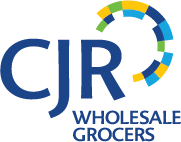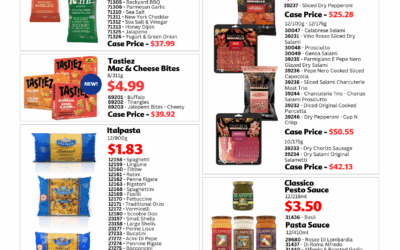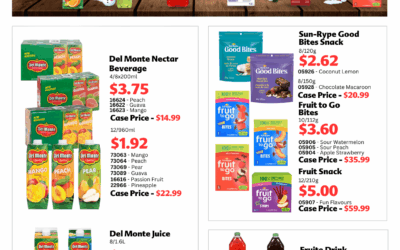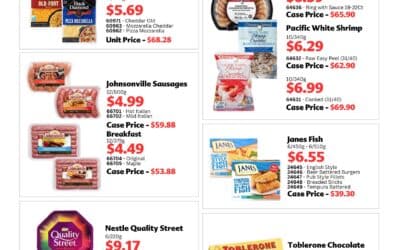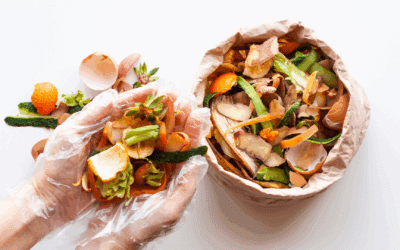The world of food distribution is a busy one, which is why, building strong relationships with grocery suppliers and distributors is not just beneficial—it’s essential. The food industry operates on the foundation of collaboration, where seamless communication, trust, and mutual respect can significantly enhance efficiency and overall success. As a food distribution warehouse, we understand that fostering these relationships directly impacts our ability to deliver high-quality products to our clients, optimize our supply chain, and adapt to the ever-changing demands of the market.
This blog will explore the various facets of building strong relationships with grocery suppliers and distributors. From establishing trust and effective communication to negotiating fair terms and leveraging technology, we’ll delve into best practices that can lead to long-lasting partnerships. By emphasizing collaboration and understanding, we can create an ecosystem that benefits all parties involved—from the warehouse to the grocery store and, ultimately, to the consumer.
The Importance of Building Strong Relationships
Overview of the Food Distribution Industry
The food distribution industry is a complex network that involves numerous players, including manufacturers, wholesalers, distributors, retailers, and consumers. Each link in this chain plays a critical role in ensuring that fresh and safe food reaches the end consumer. Given the perishable nature of many food products, timely deliveries and quality assurance are paramount.
Strong relationships with suppliers and distributors are the backbone of this industry. They enable warehouses to maintain consistent inventory levels, respond swiftly to market demands, and uphold high standards of product quality. A collaborative approach helps all stakeholders navigate challenges more effectively and adapt to changing consumer preferences.
Why Relationships with Suppliers and Distributors Matter
Building robust relationships with suppliers and distributors provides numerous advantages, including:
- Reliability: Strong relationships foster a sense of reliability between parties. When suppliers trust distributors, they are more likely to prioritize their orders, ensuring timely deliveries and minimizing stockouts.
- Quality Assurance: A solid partnership allows for ongoing dialogue about product quality. Distributors can provide valuable feedback to suppliers, leading to improved product offerings and higher customer satisfaction.
- Cost Savings: Long-term relationships often result in better pricing structures and favorable terms. Trusting partnerships enable negotiations that can lead to cost savings for both parties.
- Flexibility: Strong relationships allow for more flexible arrangements. When unexpected challenges arise—such as supply chain disruptions—partners who have built trust can quickly adapt and find solutions together.
- Innovation: Collaborating with suppliers can drive innovation. Distributors can share insights about market trends and consumer preferences, enabling suppliers to develop products that meet emerging demands.
Impact on Quality, Reliability, and Efficiency
Ultimately, the strength of relationships in the food distribution sector directly influences quality, reliability, and efficiency. When suppliers and distributors work closely together, they can optimize processes, reduce waste, and ensure that products meet consumer expectations. This collaboration is crucial in maintaining a competitive edge in a rapidly evolving market.
Key Elements of Building Trust
Transparency and Communication
At the heart of every strong relationship is transparency. Open lines of communication allow both parties to share insights, expectations, and concerns. For example, when suppliers know about a distributor’s inventory levels or sales forecasts, they can better align their production schedules to meet demand. Regular updates about market trends, seasonal fluctuations, and potential challenges create a proactive approach to problem-solving.
To foster transparency, distributors should establish clear communication protocols. This could include regular check-in meetings, shared digital platforms for updates, and even informal conversations to build rapport. The goal is to create an environment where both suppliers and distributors feel comfortable discussing challenges and opportunities openly.
Mutual Respect and Understanding
Respect is fundamental in any business relationship. Distributors must recognize the challenges suppliers face, from fluctuating raw material prices to labor shortages. Likewise, suppliers should understand the pressures distributors encounter, such as tight delivery windows and inventory management.
Mutual respect extends beyond understanding challenges; it also involves acknowledging each other’s contributions. When distributors appreciate the quality of a supplier’s products and the effort put into their production, it strengthens the bond between them. Recognition of achievements, even small ones, can go a long way in fostering goodwill and cooperation.
Consistency and Reliability
Consistency is key to building trust. Distributors should strive to meet their commitments, whether it’s adhering to delivery schedules or maintaining consistent order quantities. When suppliers know they can rely on distributors to uphold their end of the bargain, it fosters a sense of security in the relationship.
On the flip side, suppliers must also deliver consistently high-quality products. This creates a feedback loop of trust, where both parties depend on each other to fulfill their roles effectively. Establishing clear performance metrics can help both parties assess consistency and reliability over time.
Effective Communication Strategies
Open Lines of Communication
Maintaining open lines of communication is crucial for effective collaboration. Distributors should encourage suppliers to reach out with questions, concerns, or suggestions. This can be facilitated through regular meetings, phone calls, or even informal check-ins.
Using technology can also enhance communication. Collaborative tools, such as shared online platforms and messaging apps, can streamline information sharing. Regularly updating suppliers on inventory levels, product availability, and market trends fosters a sense of partnership.
Setting Expectations Clearly
Clear expectations are vital for successful relationships. Distributors should communicate their needs upfront, including order quantities, delivery schedules, and product specifications. This clarity helps suppliers understand what is required to meet those needs.
Additionally, both parties should establish realistic timelines for production and delivery. When everyone is on the same page regarding expectations, it reduces the likelihood of misunderstandings and helps build trust.
Regular Updates and Meetings
Regular updates and meetings are essential for maintaining strong relationships. Distributors should schedule periodic meetings to discuss performance metrics, address challenges, and explore opportunities for collaboration. This consistent engagement fosters a culture of communication and allows both parties to adapt to changing market conditions.
During these meetings, it’s important to celebrate successes and acknowledge areas for improvement. Acknowledging achievements builds morale and reinforces the importance of the partnership.
Negotiating Fair Terms
Price Negotiations and Fairness
Negotiating fair terms is an integral part of building strong relationships with suppliers. Distributors should approach negotiations with an understanding of market dynamics and the value of the supplier’s products. While cost is a significant factor, it’s essential to consider the quality and reliability of the supplier’s offerings.
Fair negotiations should focus on creating a win-win scenario. This means finding a pricing structure that benefits both parties, whether through volume discounts, long-term contracts, or favorable payment terms. By fostering a collaborative approach to negotiations, both suppliers and distributors can cultivate trust and loyalty.
Long-Term Versus Short-Term Gains
In the food distribution industry, focusing on long-term relationships rather than short-term gains is critical. While securing lower prices may seem advantageous in the short run, it can jeopardize the partnership if it leads to a decline in product quality or reliability.
Distributors should prioritize building relationships with suppliers who share their long-term vision. This may involve investing in their growth or supporting them during challenging times. By focusing on mutual success, both parties can thrive in the competitive food distribution landscape.
Volume, Pricing, and Payment Terms
When negotiating, it’s crucial to discuss not only pricing but also volume and payment terms. Distributors should communicate their anticipated order volumes to suppliers, allowing them to plan production and manage inventory effectively. Clear communication about payment terms, such as invoicing schedules and credit limits, helps avoid misunderstandings and ensures timely transactions.
Building a partnership where both parties feel comfortable discussing pricing and payment terms fosters a sense of security and reliability. This transparency strengthens the relationship over time.
Creating Value for Suppliers
Supporting Suppliers’ Growth
Building strong relationships with suppliers goes beyond transactional interactions; it involves supporting their growth. Distributors can help suppliers succeed by providing valuable insights into market trends, consumer preferences, and emerging opportunities.
By sharing data on sales performance and customer feedback, distributors can empower suppliers to make informed decisions about product development and marketing strategies. This collaborative approach not only strengthens the relationship but also drives innovation in the supply chain.
Feedback and Quality Control
Constructive feedback is essential for maintaining high-quality standards. Distributors should establish clear channels for providing feedback to suppliers regarding product quality, packaging, and delivery performance. Regular quality audits can also help identify areas for improvement.
Suppliers who receive timely and constructive feedback can make necessary adjustments, leading to better products and stronger partnerships. This ongoing dialogue creates a culture of continuous improvement that benefits both parties.
Supply Chain Efficiency and Logistics Support
Distributors play a critical role in optimizing supply chain efficiency for their suppliers. By sharing logistics insights and best practices, distributors can help suppliers streamline their operations. This may involve discussing inventory management techniques, transportation options, and technology solutions.
Collaborating on logistics can lead to cost savings and increased efficiency for both suppliers and distributors. A well-coordinated supply chain ensures that products flow smoothly from producers to consumers, ultimately benefiting everyone involved.
Maintaining Quality and Consistency
Quality Assurance Standards
Establishing clear quality assurance standards is vital for maintaining the integrity of products in the food distribution industry. Distributors should work closely with suppliers to develop and implement these standards, ensuring that both parties understand the expectations for quality.
Regular quality assessments and audits can help identify any deviations from these standards. By collaborating on quality control processes, distributors can help suppliers maintain high-quality products, leading to satisfied customers and a positive reputation.
Continuous Improvement Initiatives
The food distribution industry is constantly evolving, and both suppliers and distributors must prioritize continuous improvement. By fostering a culture of innovation and collaboration, both parties can identify opportunities for growth and enhancement.
Distributors should encourage suppliers to explore new technologies, processes, and product offerings. Regular brainstorming sessions or workshops can facilitate idea sharing and drive improvements throughout the supply chain.
Managing Seasonal and Supply Disruptions
The food industry often faces seasonal fluctuations and supply disruptions due to various factors, such as weather events, market trends, and changing consumer preferences. Building strong relationships enables suppliers and distributors to navigate these challenges collaboratively.
Open communication during periods of disruption allows both parties to adapt quickly. For instance, if a supplier experiences a crop failure due to bad weather, a strong relationship enables distributors to pivot to alternative products or suppliers to minimize disruptions in the supply chain.
Technology and Innovation in Supplier Relationships
How Technology Improves Transparency and Trust
In today’s digital age, technology plays a pivotal role in enhancing supplier relationships. Utilizing technology solutions can improve transparency and communication between distributors and suppliers.
For instance, cloud-based platforms allow both parties to share real-time data on inventory levels, sales performance, and market trends. This transparency fosters trust, as suppliers can see how their products are performing and distributors can ensure they have adequate stock on hand.
Digital Platforms and Inventory Management
Inventory management is a critical aspect of the food distribution process. Implementing advanced inventory management systems can help distributors maintain optimal stock levels and prevent stockouts.
By utilizing digital platforms, distributors can automate inventory tracking, monitor expiration dates, and analyze sales trends. This data-driven approach enables suppliers to plan production schedules effectively, ensuring a steady flow of products to meet consumer demand.
Data Sharing and Forecasting Demand
Collaboration in data sharing allows both suppliers and distributors to make informed decisions. By sharing sales data and market insights, distributors can help suppliers forecast demand accurately.
This collaborative approach to demand forecasting minimizes the risk of overproduction or stockouts, ensuring that both parties can respond swiftly to changing consumer preferences. As a result, the entire supply chain operates more efficiently.
Collaboration for Sustainability
Working Together to Reduce Waste
Sustainability is becoming increasingly important in the food distribution industry. Strong relationships with suppliers and distributors enable collaborative efforts to reduce waste throughout the supply chain.
Distributors can work with suppliers to implement waste reduction strategies, such as optimizing packaging, implementing inventory management practices, and donating surplus products to local food banks. These initiatives not only benefit the environment but also enhance the reputation of both parties.
Supporting Ethical Sourcing and Eco-Friendly Practices
Distributors have a responsibility to promote ethical sourcing and eco-friendly practices among their suppliers. By prioritizing suppliers who adhere to sustainability standards, distributors can help create a more responsible supply chain.
This collaboration can involve providing resources and support to help suppliers adopt eco-friendly practices, such as using sustainable packaging materials or reducing carbon emissions during production. Together, distributors and suppliers can contribute to a more sustainable food system.
Certifications and Compliance with Sustainability Standards
As consumers become more conscious of sustainability, certifications and compliance with industry standards are increasingly important. Distributors should work with suppliers to ensure they meet relevant certifications, such as organic, Fair Trade, or other sustainability standards.
By partnering with certified suppliers, distributors can offer their clients a range of sustainable products that align with consumer preferences. This not only meets market demand but also demonstrates a commitment to sustainability.
Challenges and Solutions
Common Challenges in Building Strong Supplier Relationships
While building strong relationships is beneficial, challenges can arise. Some common challenges include:
- Communication Barriers: Miscommunication can lead to misunderstandings, delays, and conflicts. Ensuring clear and open communication is vital to mitigating this issue.
- Quality Control Issues: Maintaining consistent quality can be challenging, especially with multiple suppliers. Establishing clear quality assurance standards can help address this concern.
- Market Fluctuations: Changes in market demand or supply chain disruptions can strain relationships. Building trust and transparency allows both parties to adapt collaboratively.
How to Resolve Conflicts and Maintain Partnerships
Conflicts may arise in any business relationship, but how they are handled can make a significant difference. Distributors should approach conflicts with a problem-solving mindset, focusing on finding solutions rather than assigning blame. Regular check-ins and open lines of communication can help identify issues early on and prevent escalation.
Adjusting to Market Changes and Economic Fluctuations
The food distribution industry is subject to various market changes and economic fluctuations. Strong relationships allow suppliers and distributors to navigate these challenges more effectively. By maintaining open communication and sharing data, both parties can adapt to changing conditions and find innovative solutions together.
Building Relationships in a Globalized World
Dealing with International Suppliers and Distributors
As the food distribution landscape becomes increasingly globalized, building strong relationships with international suppliers and distributors presents unique challenges. Cultural differences, language barriers, and regulatory variations can complicate communication and collaboration.
Distributors should invest time in understanding the cultures and practices of their international partners. This cultural sensitivity fosters respect and trust, enabling smoother interactions.
Cultural Sensitivities and International Regulations
Navigating cultural sensitivities is crucial when working with international suppliers. Distributors should be aware of local customs and business practices to avoid misunderstandings and foster strong relationships.
Additionally, understanding international regulations, such as import/export laws and food safety standards, is essential for maintaining compliance. Collaborating with suppliers to ensure adherence to these regulations helps build trust and reliability.
Managing Long-Distance Relationships Effectively
Long-distance relationships require proactive communication and collaboration. Utilizing technology, such as video conferencing and collaborative platforms, can facilitate regular check-ins and updates.
Setting clear expectations and maintaining open lines of communication are essential for managing long-distance relationships. By prioritizing transparency and responsiveness, distributors can build trust and rapport with their international partners.
The Future of Supplier Relationships
How AI and Automation Might Affect Supplier Relationships
As technology continues to evolve, artificial intelligence (AI) and automation are poised to reshape supplier relationships. AI can enhance data analysis, demand forecasting, and inventory management, leading to more efficient supply chain operations.
However, while technology can improve efficiency, it should not replace the human element of supplier relationships. Building trust and collaboration will remain essential, even in an increasingly automated world.
The Evolving Expectations of Suppliers and Distributors
Suppliers and distributors must adapt to changing expectations from consumers and the market. Sustainability, transparency, and ethical practices are increasingly important to consumers, and suppliers that prioritize these values will be more attractive partners.
Distributors should actively seek out suppliers who align with these evolving expectations, ensuring they can meet the demands of today’s consumers.
Preparing for Future Trends in Food Distribution
The food distribution industry is continuously evolving, and staying ahead of trends is essential. Distributors should invest in research and development, market analysis, and innovation to anticipate changes in consumer preferences and industry standards.
By fostering strong relationships with suppliers, distributors can collaborate on new product development and explore innovative solutions that meet future demands.
Long-Term Benefits of Strong Relationships
Building strong relationships with grocery suppliers and distributors is essential for success in the food distribution industry. Through transparency, effective communication, and mutual respect, both parties can cultivate trust and collaboration.
By focusing on long-term partnerships rather than short-term gains, distributors can create value for suppliers and optimize supply chain efficiency. Ultimately, these strong relationships lead to improved product quality, reliability, and sustainability—benefiting all stakeholders involved.
Investing in supplier relationships is not just a business strategy; it is a commitment to building a resilient, efficient, and sustainable food distribution ecosystem. Together, distributors and suppliers can navigate challenges, embrace innovation, and drive success in an ever-evolving market.
